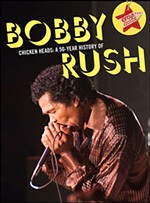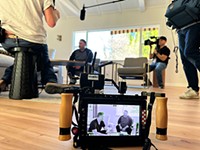Eastside Kings Fest Preview: Bobby Rush Talks Pandemic Life, Dolemite & Race
Blues showman appears virtually from Austin on Monday
By Kevin Curtin, 10:00AM, Fri. Oct. 2, 2020
Eastside Kings Fest, the annual multi-club concert series promoting the cultural heritage of Austin’s African American blues and gospel music, goes virtual this year. Monday night, 7pm, on the ESK Facebook page, that history and future continues with a revue-style concert broadcast.
Soul Man Sam, Orange Jefferson, Lavelle White, Classie Ballou, Birdlegg, Tutu Jones, Andrea Dawson, Crystal Thomas and Bobby Rush are all in on the action, backed by two tight combos: Texas Horns and Eastside Kings band - as anchored by Jason Moeller, one of ESK’s organizers. Expect a hi-fi affair, with esteemed engineer Stuart Sullivan at the helm of production.
Charismatic blues entertainer Bobby Rush, who commuted from his home in Jackson, MS., for the taping, took a call this week to drop some history on us.
Austin Chronicle: How is pandemic life for you?
Bobby Rush: I’m good as good as you can be for the time being, because we’re all isolated away and can’t get no work and clubs are closed down. Nobody really doing their thing – a few virtual things. Just trying to survive the best that we can and hope and pray that this will get better.
This is no joke.
We must abide by the rules and regulations of the science. Wash your hands and wear your mask and stay your distance and just do all you can. You gotta show love to your fellow man and ladies to try to survive this thing together, because we’re all in it together. That’s my mantra.
AC: You’ve toured relentlessly for 70 years. What’s it like to be grounded like this?
BR: It’s been the strangest time – the most downtime I’ve had in 70 years. There’s no income coming in since February 29, but I can remember my earlier career when I was working and there wasn’t no income anyway.
So I’ve been through the income thing. I was thinking about it the other day. In 1951, I got a job in Illinois, where I was making $7.50 a night as a bandleader and I had Muddy Waters, who I was paying $5 a night as a special guest on Friday, Saturday, Sunday.
AC: What do you do when you’re bored?
BR What I do is grab my guitar and go in my bathroom or some room and set myself up. I play and escape through my music – write and read and study. I’ve always done that. When times get hard, I pick up guitar, soothe myself, and uplift from the down valleys of whatever I’m going through.
AC: What are your earliest memories of playing in Austin?
BR: Yeah, I played a few joints, but I don’t remember what they were called.
AC: There was a spot called the Victory Grill.
BR: I remember the Victory Grill, yes. I played there. It wasn’t nothing but a local tavern, man. We also had another little place in Austin, a recreation center for teenagers, because they couldn't come to the juke joint at 9pm.
So we had two audiences: played earlier for the teenagers, then at night for the adults.
That would have been 1959, 1960, maybe 1961. Then, later, there was another place we started to play when it opened up. I forgot the name, real popular place.
AC: Antone’s.
BR: Yeah. That was the Cadillac of joints at that time. That was like uptown!
AC: Your new album Rawer Than Raw features you on vocals, acoustic guitar, harmonica, and foot tapping. There’s a lot of covers and listeners know them as songs from blues legends, but you knew them all personally, so they must have different meaning to you.
BR: This is a very personal thing to me. The hardest thing to me was to put all the guy’s records on there who I respect, because there’s so many of them! “Hard Times” [composer Lane Hardin] was the only guy I didn’t know personally, but I liked the song and felt like it fits to what’s going on now.
Times are harder than they ever were before.
I decided I would put all people on it from Mississippi. People from Mississippi, wherever they go – L.A. or Chicago – you can always tell they’re from Mississippi when they open their mouth. When I looked back on the songs and who did them, Mississippi guys never changed. You could always tell a guy from the Delta.
AC: What was Howlin’ Wolf like?
BR: Oh God, Howlin’ Wolf. He come to be very close to me as a friend and a mentor. Didn’t take no shit off a nobody. He was just to the point. He and J.B. Lenoir were two of the few people [to whom] Black life mattered back in the day! Those were some guys who were about who they are and not ashamed about it.
I remember in 1961, I was in the studio with Howlin’ Wolf, recording. Leonard Chess wanted him to howl and he said, “I’m not howlin’, busting my gut for these white people!” I didn’t understand where he was coming from then, but he knew about the business side of it. He didn’t take no jive.
His hands was a big as a car fender, you follow me? God, man! You know, he was standing like a Jack Johnson. He’s 40 years old and he can pick up a truck and turn it around with his hand. You didn’t mess with no Howlin’ Wolf, man.
He didn’t take no shit.
In a club one night, a guy called him something. He didn’t say a word. He just turned around and flattened him. One lick and the guy was out cold.
He didn’t take no shit. He’d fight a brick.
Little Walter was a guy who was a good friend and my neighbor. One of the reasons I went to Chicago was because of Little Walter. He didn’t take no shit either, but he got his butt whupped every night!
He’d get drunk and fight and couldn’t whup nothin’. Howlin’ Wolf wouldn’t drink nothing, but he’d whup everything around him. He’d whup a bear.
AC: There’s a necessary reckoning happening right now with white America’s treatment toward Black people and not just in policing, but in music and entertainment and the arts. I know you’ve dealt with horrifying racism in your own career. What’s your reaction to what’s happening now.
BR: I’m looking at what’s happening now, but in my age and time, what I saw compared to what I’ve seen now – all the changes that have been made – seems like to me it’s remained the same. In 1951, my first encounter in this kind of thing happened to myself and J.B. Lenoir and Howlin’ Wolf when we went to a suburb of Illinois. We played behind a curtain because they wanted to hear our music, but didn’t want to see our faces as black men.
I’m about the only guy who talks about what went on because I’ve always been independent.
I was the king of the Chitlin Circuit, because I was so independent. I thought I was good enough at what I was doing that I would get hired as an entertainer since I didn’t really count myself as a musician. I was a better entertainer than I was a musician, but I came to play instruments well and became a good musician. I was also a good negotiator: I could talk to someone, get a job, and do it well.
AC: I got a kick out of seeing you in the Netflix movie that came out last year with Eddie Murphy, Dolomite Is My Name. What was that experience like?
BR: It was the best experience I ever had in my life! Let me tell you something, everyone treated me so well. Then again, nobody knew I was in the movie, because they didn’t advertise that I was in it, so people didn’t know until they saw it.
My performance in it, I did it well enough that when you did see me, it stuck out. That’s what I tried to do.
AC: What was Eddie Murphy like?
BR: Oh god, I wanted to meet Eddie Murphy. I told the producer of the movie, I said, “Listen man, I want to meet Eddie.” When Eddie came to the set, he stopped the set and embraced me. He treated me like gold.
A note to readers: Bold and uncensored, The Austin Chronicle has been Austin’s independent news source for over 40 years, expressing the community’s political and environmental concerns and supporting its active cultural scene. Now more than ever, we need your support to continue supplying Austin with independent, free press. If real news is important to you, please consider making a donation of $5, $10 or whatever you can afford, to help keep our journalism on stands.
Scott Jordan, Dec. 18, 2015
April 19, 2024
April 12, 2024
Bobby Rush, Eastside Kings Fest 2020, Birdlegg, Crystal Thomas, Orange Jefferson, Soul Man Sam, Lavelle White, Classie Ballou, Tutu Jones, Andrea Dawson, Texas Horns, Eastside Kings, Jason Moeller, Muddy Water, Lane Hardin, Victory Grill, Antone’s, Leonard Chess, Howlin’ Wolf, J.B. Lenoir











